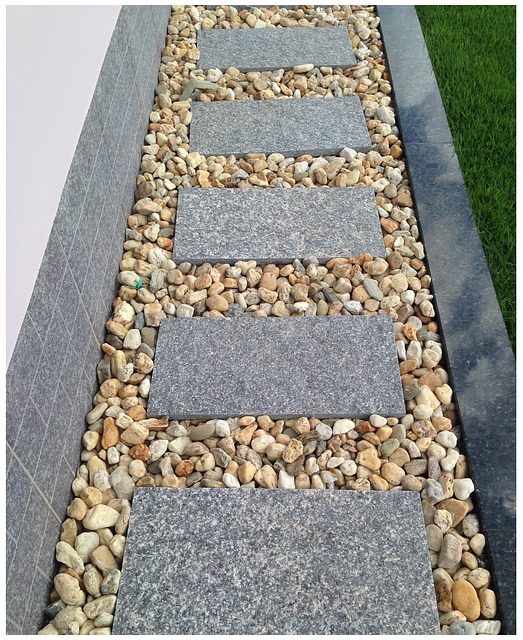We’ve already written other guides similar to this one such as considerations for picking dog friendly yard surfaces.
But, there’s a few little things to be mindful of when picking dog friendly landscaping rocks for your yard.
Although the type of rock is not as much of a major concern, the way they are arranged can be, as well as the shape.
In this short little guide, we have outlined some tips for what you can look for in dog friendly landscaping rocks, as well as examples of how they are commonly used in yards around the home.
Let’s have a look …
(NOTE: this is a general informational and educational guide only. Speak to a qualified person for professional advice – this information is not a substitute for the advice of an expert.)
Dog Friendly Landscaping Rocks: What To Know
What Are Landscaping Rocks?
Landscaping rocks are generally any rock or stone that is used around the front or back yard of a house either for practical or appearance purposes.
How Are Landscaping Rocks Commonly Used?
Landscaping rocks are commonly used in pathways, garden borders and beds, and on features like water or pond features are common examples.
Sometimes they are also used as walls or barriers as well.
How To Landscaping Rocks Benefit You And Your Dog In A Yard?
Rocks are great for keeping your dog from digging dirt, getting under boundary fences or as walls preventing access to garden beds
They are good for providing a smooth surface for dogs to walk on
They are good for naturally wearing down dogs’ nails
They are very durable and require essentially no maintenance time or costs
When Do Landscaping Rocks Become Non Dog Friendly?
When they are sharp or jagged – which can cut your dog’s paws
When they are loose on a pathway – can lead to your dog slipping and injuring themselves or hurting bones and/or muscle if they are running
A yard of mostly rocks that heat up in the summer – can burn your dog’s paws
A yard mostly of rocks with little soft cover like grass – if you have a large dog who is running and laying on hard ground constantly, this can put more pressure on the joints
Rocks that could fall on your dog. Arrange them so they are solidly in place
Rocks that border mulches which your dog might eat – could damage their teeth or they could swallow them. Make sure rocks are in an area that is clearly distinguishable
Dog Friendly Landscaping Rocks Tips
Pick flat and/or smooth rocks
Make sure rocks are set in the ground in traffic-able areas
Make sure your dog has somewhere cool to walk and lay in the hotter seasons apart from on the rocks
Make sure your dog has somewhere soft to lay apart from on the rocks
Make sure stacked rocks are solid and well set together with no chance of falling on your dog
Make sure rocks and pebbles aren’t mixed in with materials your dog may want to eat
Examples Of Commonly Used Landscaping Rocks In Yards
Flat Flagstones
Flagstones are large, flat, loose pieces of stone that are known for their irregular shapes, sizes and thicknesses.
They are very popular as landscaping rocks and commonly used for outdoor surfaces such as pathways, patios, pool decks, stairways & driveways.
They have even been used on water features and as wall cladding for archways and on main houses.
They might come as sandstone, quartzite or slate.
Large Shaped Garden Rocks, River Rocks and Boulders
Flagstones are flat, but you can also get garden rocks, river rocks and garden boulders which are spherical or round and much bigger.
Definitely be careful with these rocks that they are secure and won’t fall over onto your dog.
Garden rocks make good barriers to plants and flowers, river rocks are great for backyard ponds, while garden boulders you can build up around fences, walls and features.
Small Rocks and Garden Pebbles
Small rocks and garden pebbles have a few uses.
They might be used as loose rocks/pebbles for pathways. They might also be used in a pathway but set in the pathway with sand cement so they don’t move.
They can also be used in garden beds.
Friendly Disclaimers
TheDailyShep.com is a participant in the Amazon Services LLC Associates Program, an affiliate advertising program designed to provide a means for sites to earn advertising fees by advertising and linking to Amazon.com.
Amazon and the Amazon logo are trademarks of Amazon.com, Inc., or its affiliates.
Additionally, TheDailyShep.com participates in various other affiliate programs, and we sometimes get a commission through purchases made through our links.
TheDailyShep.com are not veterinarians, or animal professionals/experts. Information provided is for informational purposes only – it is not a substitute for professional or qualified advice.
The information is based on either our own thorough research, and/or own experiences, as a means of free speech.
By consuming this information, you accept that TheDailyShep.com do not have client or patient relationship with you, and TheDailyShep.com are not advising you to act on anything you read.
You should always consult your own veterinarian, animal expert, or health care professional and follow their advice before making decisions on all matters.
You can find our full set of disclaimers and T & C’s in the footer of this site.
Enjoy your reading, and thank you for being here
','' ); } ?>